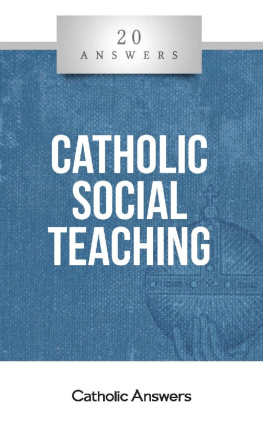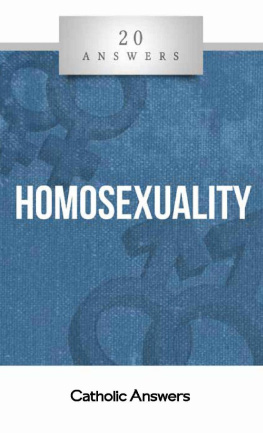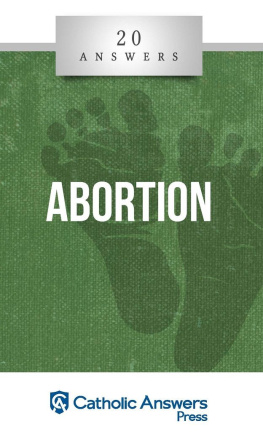Mark Brumley - 20 Answers - Catholic Social Teaching (20 Answers Series from Catholic Answers Book 38)
Here you can read online Mark Brumley - 20 Answers - Catholic Social Teaching (20 Answers Series from Catholic Answers Book 38) full text of the book (entire story) in english for free. Download pdf and epub, get meaning, cover and reviews about this ebook. year: 2020, publisher: Catholic Answers Press, genre: Religion. Description of the work, (preface) as well as reviews are available. Best literature library LitArk.com created for fans of good reading and offers a wide selection of genres:
Romance novel
Science fiction
Adventure
Detective
Science
History
Home and family
Prose
Art
Politics
Computer
Non-fiction
Religion
Business
Children
Humor
Choose a favorite category and find really read worthwhile books. Enjoy immersion in the world of imagination, feel the emotions of the characters or learn something new for yourself, make an fascinating discovery.
- Book:20 Answers - Catholic Social Teaching (20 Answers Series from Catholic Answers Book 38)
- Author:
- Publisher:Catholic Answers Press
- Genre:
- Year:2020
- Rating:5 / 5
- Favourites:Add to favourites
- Your mark:
- 100
- 1
- 2
- 3
- 4
- 5
20 Answers - Catholic Social Teaching (20 Answers Series from Catholic Answers Book 38): summary, description and annotation
We offer to read an annotation, description, summary or preface (depends on what the author of the book "20 Answers - Catholic Social Teaching (20 Answers Series from Catholic Answers Book 38)" wrote himself). If you haven't found the necessary information about the book — write in the comments, we will try to find it.
Mark Brumley: author's other books
Who wrote 20 Answers - Catholic Social Teaching (20 Answers Series from Catholic Answers Book 38)? Find out the surname, the name of the author of the book and a list of all author's works by series.
20 Answers - Catholic Social Teaching (20 Answers Series from Catholic Answers Book 38) — read online for free the complete book (whole text) full work
Below is the text of the book, divided by pages. System saving the place of the last page read, allows you to conveniently read the book "20 Answers - Catholic Social Teaching (20 Answers Series from Catholic Answers Book 38)" online for free, without having to search again every time where you left off. Put a bookmark, and you can go to the page where you finished reading at any time.
Font size:
Interval:
Bookmark:
20 Answers
g
Catholic Social Teaching
Mark Brumley

20 Answers: Catholic Social Teaching
Mark Brumley
2020 Catholic Answers
All rights reserved. Except for quotations, no part of this book may be reproduced or transmitted in any form or by any means, electronic or mechanical, including photocopying, recording, uploading to the Internet, or by any information storage and retrieval system, without written permission from the publisher.
Published by Catholic Answers, Inc.
2020 Gillespie Way
El Cajon, California 92020
1-888-291-8000 orders
619-387-0042 fax
catholic.com
Printed in the United States of America
978-1-68357-177-3
978-1-68357-178-0 Kindle
978-1-68357-179-7 ePub
Introduction
Catholic social teaching has been called the Churchs best-kept secret, suggesting that most people, Catholic or non-Catholic, would embrace the teaching if only they knew it.
Thats a little too optimistic. There are plenty of reasons to suppose that not even a thoughtful presentation will persuade everyone. Not everyone was persuaded by Christ to accept the coming kingdom of God by becoming his disciple. We shouldnt expect everyone to be won over simply by letting out the Churchs best-kept secret.
Indeed, as a longtime student and teacher of Catholic social teaching and as a former director of social ministry for a Catholic diocese, I can say that ignorance of the teaching isnt the only problem, either for Catholics or for non-Catholics. Instead its often a question of the heart more than of the head.
That said, often the issue is a question of people not knowing what the Church teaches and why. And when people discover the secret, frequently it transforms them. I have known non-Catholics who became Catholics as a result of their encounter with Catholic social teaching. For the non-Catholic Christians among them, they recognized the voice of Christ in the teaching of the Church. For the non-Christians, they saw the work of God in the work of Christs people, the Church.
What about Catholics? We too need conversion. We need faith formation, to be sure. Faith formation starts with in formationwith the content of the Churchs teaching. The same applies to formation in the social teaching of the Church.
But faith formation involves more than getting information, even more than profound understanding of great ideas and insights into the truthas valuable as those things are. Faith formation involves growth in faith. Hence conversion: ongoing conversion.
For the Catholic, Catholic social teaching should involve growth in faith as a disciple of Jesus. It is instruction in how a disciple of Jesus lives well with others in society and how society ought to be shaped, through what influence Christians may have, to reflect Gods purpose for humanity. And insofar as Catholic social teaching provides direction for action, it should deepen charitylove of God and love of neighborby proper deeds.
A little book such as this can only scratch the surface of what the Churchand Christ through the Churchhas to say about how human beings are intended to live well together. Its but a beginning. Still, although the beginning of a journey isnt its conclusion, the conclusion cant be reached without the beginning.
1. What is Catholic social teaching?
Catholic social teaching is Jesus teaching on how human beings should live with one anotherin the family, in society, and in the world. Obviously, all sorts of refinements and qualifications to that broad statement can be made. The point is to start with Jesus, lest we lose sight of a fundamental truth. There is, ultimately, one authoritative Teacher in the Catholic Church: Jesus Christ (Matt. 23:10; Luke 10:16; Catechism of the Catholic Church [CCC] 79, 85, 87). The Church sometimes adopts concepts and introduces ideas to help people understand and apply Jesus teaching. Nevertheless, we should think of Catholic social teaching as an aspect of the teaching of the Lord , even though it is presented by his Church (CCC 2422).
Jesus inaugurated the kingdom of God on earth (Mark 1:1415). That kingdom transcends specific location; it is the proper ordering of human relationships according to Gods purpose, wherever people happen to reside. Living according to Gods law, by his power, for his purposes, makes people subjects of his kingdom. By teaching about the kingdom and living in obedience to the Fathers mission for him, Jesus fully revealed Gods purpose for mankind. He taught us how to live. Through the gift of the Holy Spirit to the Church at Pentecost, he made his grace available to humanity and made all human beings able to become part of the family of God.
The Church is the beginning or seed of the kingdom of God ( Lumen Gentium 5; cf. CCC 541). The Church carries on the teaching of Jesus and, by the power of his Holy Spirit, interprets his teaching throughout history, applying it to the concrete situations of human life. Catholic social teaching is part of that teaching. It is the body of principles for reflection, criteria for judgment, and directives for action aimed at promoting the proper ordering of human relationships according to the standards of the gospel. In other words, Catholic social teaching helps us to understand how to live well together, as God intends (CCC 2423).
2. What are the main principles of Catholic social teaching?
Catholic social teaching, like all the Churchs ethical teaching, rests on the commandments of charity: love God above all things and love neighbor as oneself. Those two great commandments expand into more specific principles.
First, there is the principle of the social obligation to acknowledge God . Positively, this involves how society honors God and acknowledges him as the source of human dignity. Negatively, it involves society not violating peoples freedom to worship or their freedom to obey God in how they shape their lives (CCC 21042109).
After the social acknowledgment of God come principles concerning how human beings ought to live together in society. The Church states these principles in various ways. The Compendium of the Social Doctrine of the Church , published by the Vaticans Pontifical Council for Justice and Peace in 2004, lists the following principles: 1) the dignity of the human person, 2) the common good, 3) subsidiarity, and 4) solidarity.
The United States Conference of Catholic Bishops provides a somewhat expanded list of items, referred to as themes of Catholic social teaching: 1) the life and dignity of the human person; 2) the call to family, community, and participation; 3) rights and responsibilities; 4) option for the poor and vulnerable; 5) the dignity of work and the rights of workers; 6) solidarity; and 7) care for Gods creation.
These lists arent exactly the same, but they summarize closely related ideas drawn from the primary sources of Catholic social teaching: Sacred Scripture, Catholic tradition, especially the teaching of the early Church Fathers, the Magisterium of the Church, especially papal social teaching starting with Leo XIII (r. 18781903) and the teaching of the Second Vatican Council (19621965). After Vatican II, Popes Paul VI (r. 19631978), John Paul II (r. 19782005), Benedict XVI (r. 20052013), and Francis (r. 2013) all made significant contributions to Catholic social teaching.
Social justice and human rights are often also included as principles of Catholic social teaching. These are bound up with the notions of human dignity and the common good mentioned above, and we will discuss social justice in some detail elsewhere. Here, lets look briefly at human rights.
Next pageFont size:
Interval:
Bookmark:
Similar books «20 Answers - Catholic Social Teaching (20 Answers Series from Catholic Answers Book 38)»
Look at similar books to 20 Answers - Catholic Social Teaching (20 Answers Series from Catholic Answers Book 38). We have selected literature similar in name and meaning in the hope of providing readers with more options to find new, interesting, not yet read works.
Discussion, reviews of the book 20 Answers - Catholic Social Teaching (20 Answers Series from Catholic Answers Book 38) and just readers' own opinions. Leave your comments, write what you think about the work, its meaning or the main characters. Specify what exactly you liked and what you didn't like, and why you think so.







